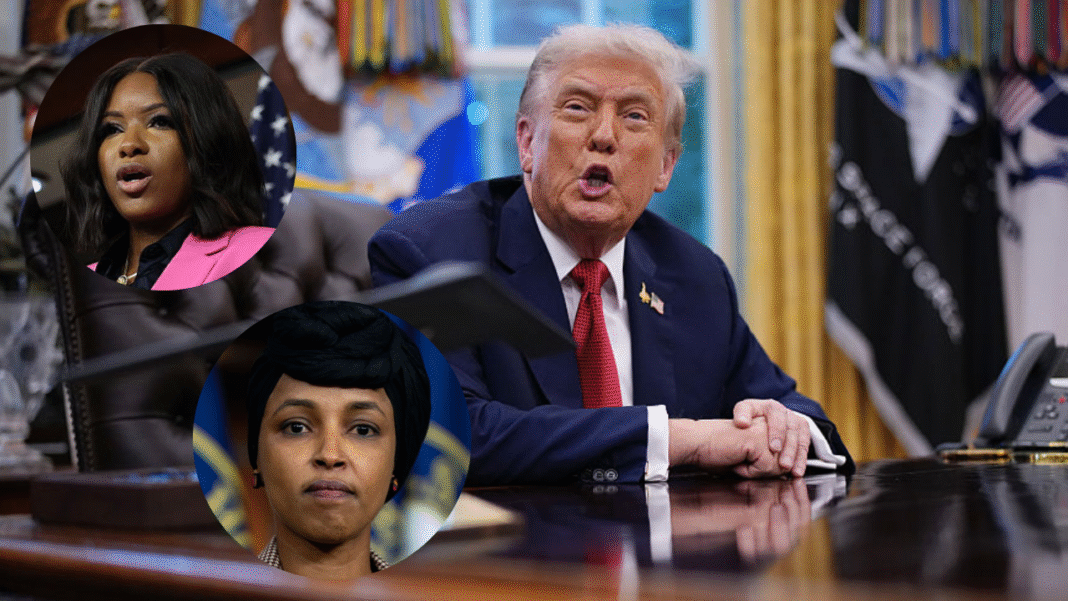Trump’s Recent Comments: A Provocative Exchange with Congresswomen Crockett and Omar
On a notable Thursday in the Oval Office, President Donald Trump sparked controversy with a series of personal insults directed at U.S. Congresswomen Jasmine Crockett and Ilhan Omar. The exchange occurred when a reporter questioned Trump about Crockett’s recent inflammatory remarks comparing the U.S. Immigration and Customs Enforcement (ICE) to historical slave patrols—a comparison that has ignited heated debates across political lines.
The Context of the Remarks
Trump’s insults came swiftly, reflecting his longstanding aggressive rhetoric towards political opponents. As soon as he heard the name Jasmine Crockett, he was quick to launch into a diatribe, labeling the congresswoman as a “very low-IQ person.” The comment drew laughter from his Cabinet members, including Vice President JD Vance, Attorney General Pam Bondi, and FBI Director Kash Patel, revealing a troubling dynamic where personal insults are entertained in high-level political discussions.
Highlighting the Attack on Crockett
Within his remarks, Trump dismissed the validity of Crockett’s contributions by suggesting that “if we ever had to pass an aptitude test,” she should be the one to take it. Such statements not only undermine Crockett’s capabilities but reflect a broader trend of misogynistic and racist attacks levied at women of color in politics.
Crockett, a graduate of Rhodes College, holds a law degree from the University of Houston and was once a public defender. Before her congressional tenure, she served in the Texas House of Representatives, where she earned a reputation for her tenacious advocacy on voting rights. This background only amplifies the absurdity of Trump’s claims about her qualifications.
Mispronouncing Names: A Wider Narrative
Continuing to criticize Crockett, Trump drew an off-hand comparison with Ilhan Omar, mispronouncing her name. This minor detail serves to highlight a significant issue: the tendency of some political figures to trivialize or disrespect the identities of those they oppose. Mispronunciations are sometimes seen as symbolic of the broader dismissal of individuals and their concerns, reflecting an underlying disregard for their legitimacy.
Reference to International Relations: A Troubling Joke
Trump’s remarks took a troubling turn as he alluded to meeting the president of Somalia, Hassan Sheikh Mohamud, suggesting he might want to “take her back.” This comment not only perpetuates harmful stereotypes but also trivializes serious international relations in a manner that is unbecoming of a sitting president. The interaction raises concerns about how political rhetoric can edge into xenophobia, particularly when directed towards Congresswomen of color.
Crockett’s Reaction and the Broader Impact
In response to the attacks, Crockett has positioned herself as a rising star in the Democratic Party, facing off against persistent criticism from conservative circles. Trump’s comment about her crossing “the line” following her remarks on ICE continues to reflect an environment where conversations about race, immigration, and policing are fraught with tension and provocation.
Notably, the backdrop against which these comments take place features escalating political violence and a pervasive atmosphere of hostility towards marginalized groups. This situation is exacerbated by comments from influencers like Laura Loomer, who recently referred to Crockett in derogatory terms, further illustrating the venomous nature of contemporary political discourse.
Perspectives from the Congressional Black Caucus
In light of these developments, Yvette Clarke, Chairwoman of the Congressional Black Caucus, emphasized the gravity of the attacks on Crockett. She articulated a stark message: the Trump administration has signaled that it’s “open season on Black people.” Such declarations emphasize a chilling reality where inflammatory language can contribute to a culture of fear and hostility.
Clarke’s remarks resonate with a broader concern among lawmakers about the political climate. Her assertion that while there are calls to “tone down rhetoric,” the actual discourse is becoming increasingly toxic underscores the complexity of navigating identity and representation in contemporary politics.
The Ongoing Challenge for Women of Color in Politics
As Trump’s remarks lay bare, women of color in politics face not only the usual critiques of their policies and performances but also an unsettling barrage of personal attacks. This undercurrent of racism and sexism has become a hallmark of the criticism directed towards figures like Crockett and Omar.
These themes aren’t just subplots in a political drama; they reveal deep-seated issues about the treatment of women, particularly women of color, in leadership roles. The public reactions to such rhetoric will likely continue to shape the political landscape, as constituencies become more vocal and organized in resistance against racial and gender-based attacks.
In an era where political discourse increasingly veers into the personal and vitriolic, remaining vigilant and actively challenging these narratives becomes essential for fostering a more equitable political environment.



